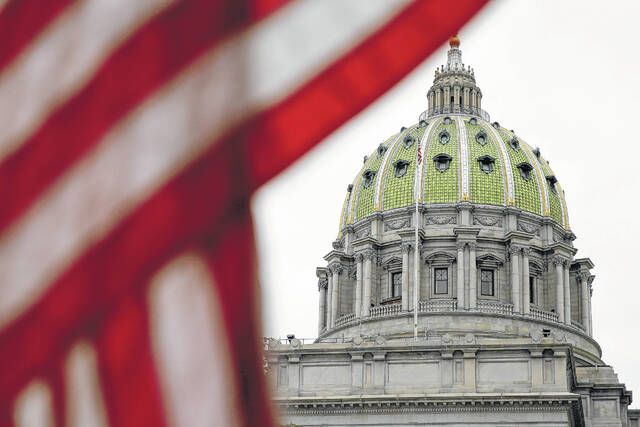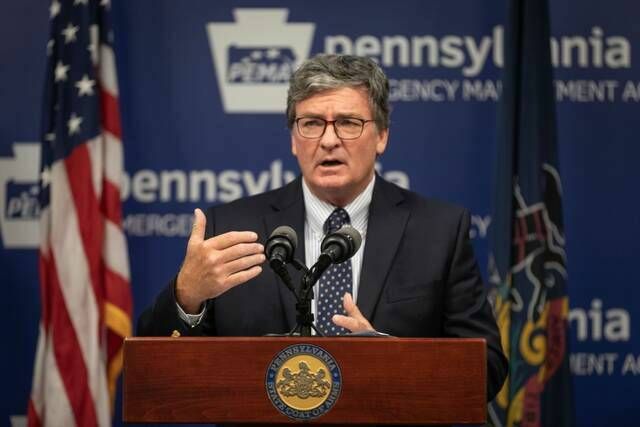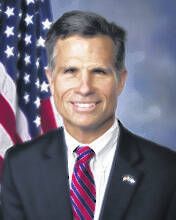Click here to subscribe today or Login.
WILKES-BARRE — The State Transportation Commission (STC) this week adopted the 2025 12-Year Transportation Program (TYP).
The plan anticipates that $88 billion will be available over the next 12 years for improvements to roads, bridges, transit systems, airports, railroads and active transportation — an increase of more than 5% from the 2023 TYP.
The TYP, PennDOT’s official mid-range planning tool, lists statewide planned projects across all modes of transportation and assigns funding over a 12-year period.
The TYP also highlights some of PennDOT’s initiatives and accomplishments over the past two years ranging from the modernization of train stations to implementing innovative strategies and the latest technologies to enhance safety and efficiency across a wide range of operations.
“Transportation planning is a lengthy and collaborative process,” said PennDOT Secretary Mike Carroll. “By the time a new project starts in your neighborhood, it’s already several years old. PennDOT is always seeking ways to improve transportation infrastructure, and we look forward to putting the next 12 years of improvements into motion for travelers around the state.”
The newly adopted program, which takes effect Oct. 1, 2024, anticipates the following funding availability in the first four years of the TYP from federal, state, and local sources:
• $16.4 billion for state highway and bridge projects.
• $12.5 billion for public transit.
• $352 million for multi-modal projects.
• $236 million for rail freight.
• $175 million for aviation.
Four Rural Planning Organizations, 19 Metropolitan Planning Organizations and one independent county partnered with PennDOT to review and develop the update.
Now that the STC has adopted the update, it has been submitted to the Federal Highway Administration (FHWA) and the Federal Transit Administration for review. The FHWA coordinates with the U.S. Environmental Protection Agency to review the plan’s conformity with air quality requirements.
Carroll said public input early in the TYP planning process played a key role in identifying investments in the various transportation modes.
The State Transportation Commission is chaired by PennDOT Secretary Carroll and consists of 10 appointed citizens as well as the majority and minority chairs of the state House and Senate Transportation committees. Pennsylvania State Law, Act 120 of 1970 requires PennDOT to prepare, update and submit Pennsylvania’s TYP every two years to the STC.
For more information about the TYP, visit https://talkpatransportation.com/how-it-works/typ.
If you have other questions or challenges, contact PennDOT’s Bureau of Equal Opportunity to request help by emailing [email protected] or calling 717-787-5891; TTY (711).
Meuser co-sponsors legislation to oppose Biden-Harris EV rule
U.S. Rep. Dan Meuser, R-Dallas, this week co-sponsored H.J.Res.199 — a resolution of disapproval to nullify the Biden-Harris National Highway Traffic Safety Administration (NHTSA) rule titled “Corporate Average Fuel Economy Standards for Passenger Cars and Light Trucks for Model Years 2027-2032 and Fuel Efficiency Standards for Heavy-Duty Pickup Trucks and Vans for Model Years 2030-2035.”
Meuser said this resolution pushes back on the Biden-Harris administration’s continued Electric Vehicle (EV) mandate.
NHTSA’s Corporate Average Fuel Economy (CAFE) mandates fuel efficiency for passenger cars, light trucks, and medium- and heavy-duty trucks. The rule imposed by NHTSA sets unrealistic standards, difficult to attain for most vehicles, effectively forcing Americans to purchase electric or other compliant vehicles.
In December 2023, Meuser said the House passed the Choice in Automobile Retail Sales (CARS) Act, which Rep. Meuser supported, to block the Biden administration from enforcing strict emission standards that limit consumer choice.
In January 2024, Rep. Meuser joined 120 colleagues in signing a letter urging a reversal of the proposed rule. Despite their efforts, Meuser said NHTSA finalized the rule in June 2024, extending these standards to vehicles starting in model year 2027 and to heavy-duty pickups and vans by 2030.
“To push an EV agenda without proper infrastructure in place to support it is bad enough,” Meuser said. “But infringing on Americans’ right to choose the type of vehicle they drive is far worse. Whether you’re an auto worker, a small business owner or just a regular family that wants to buy the car that works best for your household, these mandates will affect us all.
“To put consumers, workers and energy security first, these harmful rules and the assault on our gas-powered auto economy must be stopped. I urge my colleagues to support this resolution, which will aim to ensure the freedoms of Pennsylvanians’ and all Americans’.”
H.J.Res.199 was referred to the Energy and Commerce Committee for further consideration.
AG Henry joins multistate coalition to protect regulations on gun sales
Attorney General Michelle Henry joined a coalition of 21 attorneys general led by New York in support of “common sense” state and federal laws that regulate the sale of guns.
The coalition filed an amicus brief in U.S. v. Steven Perez, arguing that federal laws preventing individuals from transporting or receiving firearms from outside the state in which they reside are essential to protecting public safety.
The amicus brief, filed in the United States Court of Appeals for the Second Circuit, explains that state and federal regulations of firearms dealers help reduce violent crime and support law enforcement investigations.
“Preventing guns from crossing state lines — except when federally allowed — will keep guns from getting into the wrong hands through unlawful transfers like straw purchases,” AG Henry said. “My office will continue our efforts to combat gun violence by exposing and holding bad actors culpable for violating the laws. I am thankful for the opportunity to work collaboratively with other attorneys general to encourage strong gun regulations on the state and federal level.”
In 2020, Steven Perez received illegally purchased weapons from an unlicensed firearms dealer in South Carolina that were transported to him in New York City. Mr. Perez was later arrested, criminally prosecuted, convicted, and sentenced to prison in New York.
Mr. Perez is appealing his conviction that was handed down by the U.S. District Court for the Southern District of New York, claiming that it violates his Second Amendment right to carry a firearm.
The multistate coalition argues that federal regulations related to the transport of guns across state lines protect public safety, fortify state gun laws, and do not infringe on Second Amendment rights.
The attorneys general explain that state regulations of firearms dealers prevent the misuse of guns and help law enforcement effectively investigate gun-related crimes.
For example, 17 states, including New York, require licensed firearms dealers to maintain detailed records of their inventory and sales, which help law enforcement investigate violent crime and keep communities safer by ensuring that law enforcement has thorough, up-to-date information.
Additional state regulations help curb unlawful access to firearms through theft, straw purchases, and illegal sales.
Joining Attorney General Henry in filing this amicus brief are the attorneys general of California, Colorado, Connecticut, Delaware, Hawaii, Illinois, Maine, Maryland, Massachusetts, Michigan, Minnesota, Nevada, New Jersey, New York, North Carolina, Oregon, Rhode Island, Vermont, Washington, Wisconsin, and the District of Columbia.
Auditor General: New website makes audit information easier to access
Auditor General Timothy L. DeFoor this week launched the department’s new website to make it easier for Pennsylvanians to find audits in their county, as well as resources to help them better understand audits.
“Our new, dynamic website was designed with Pennsylvania taxpayers in mind,” Auditor General DeFoor said. “We all need to know how our tax dollars are being spent to be able to hold state and county government accountable. This website offers a variety of new tools and resources to make it easier than ever to find an audit and understand the impact it has on your community.”
The site houses more than 50,000 audits including those involving Volunteer Fire Relief Associations, municipal pensions, county row officers, state government programs and performance audits. Each year, the department performs approximately 4,000 audits.
“Last October, as part of our ongoing transformation initiative, we reached out to Pennsylvanians and asked them what they needed from our website,” DeFoor said. “I want to thank the stakeholders, employees and the residents who responded. This site represents your input, and we couldn’t have done it without you.”
The department’s redesigned website replaces the version from 2015 and includes accessibility functions so all Pennsylvanians can use the site, regardless of the language they speak or accessibility device they are using. It is also adaptable for mobile devices.
Reach Bill O’Boyle at 570-991-6118 or on Twitter @TLBillOBoyle.









